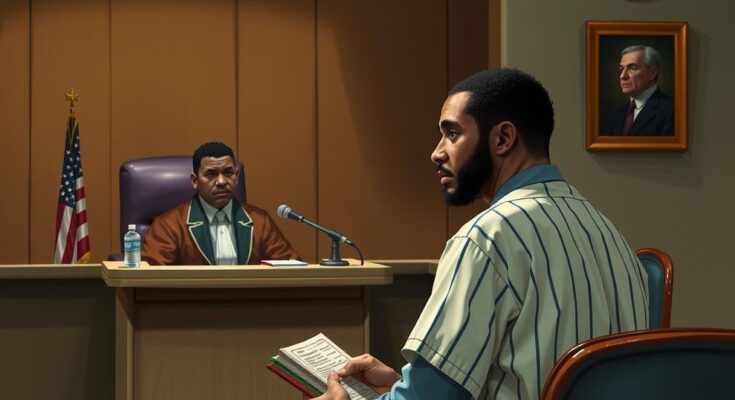A Malian court has sentenced political figure Issa Kaou N’Djim to two years in prison for making critical remarks about Burkina Faso’s military rulers. The decision follows his comments on Joliba TV News, which was subsequently banned. The case coincides with the abduction of another opposition figure, Ibrahim Naby Togola, illustrating the repressive environment under military rule. Both Mali and Burkina Faso have witnessed who suppress dissent since recent coups.
A Malian court has sentenced Issa Kaou N’Djim, a political figure and former supporter of the military junta leader Assimi Goita, to two years in prison following critical remarks about the military rulers of Burkina Faso. The verdict, delivered in Bamako, includes a one-year suspended sentence and a fine of 1 million CFA francs (equivalent to $1,600). N’Djim’s comments were made on the local television station Joliba TV News, which was subsequently closed by authorities for its reporting. This incident coincides with the alarming disappearance of another opposition figure, Ibrahim Naby Togola, who was reportedly abducted by unidentified armed assailants.
Mali, along with Burkina Faso, has been under military rule since coups d’état in 2020 and 2022. These regimes have enacted strict measures against the press, including the suspension of foreign media and the repression of dissenting voices. The political climate is tense, and there are growing concerns over human rights abuses in both countries. N’Djim had previously served as vice president of Mali’s National Transitional Council and has faced legal consequences in the past for his outspoken views, including a suspended sentence for social media comments that were perceived as subversive.
The situation reflects the deteriorating state of political freedoms in Mali, where the junta’s grip on power is reinforced by efforts to silence critics. The abduction of Ibrahim Naby Togola highlights the precarious position of opposition figures in an increasingly authoritarian environment. Mali and Burkina Faso continue to navigate complex political and security challenges as their military governments combine efforts under the Alliance of Sahel States (AES).
This article addresses the challenging political landscape in Mali, particularly under military rule following consecutive coups. Issa Kaou N’Djim’s imprisonment illustrates the tensions surrounding free speech and dissent in a regime that has emphasized control over criticism. With a history of suppressing opposition voices and media, the junta has fostered an environment where criticism can lead to severe legal repercussions. Concurrently, the abduction of another political figure underscores the climate of fear prevalent among dissenters. Understanding these dynamics is crucial in analyzing the trajectory of governance and human rights in Mali and its neighbors.
In conclusion, the sentencing of Issa Kaou N’Djim reinforces the increasingly repressive nature of Mali’s military government, where dissent is met with harsh legal repercussions. The parallel abduction of Ibrahim Naby Togola highlights ongoing threats faced by opposition figures. As Mali navigates its political crisis, the actions taken against critics serve as a stark reminder of the fragile state of civil liberties and the ongoing struggle for democratic governance in the region.
Original Source: www.voanews.com




